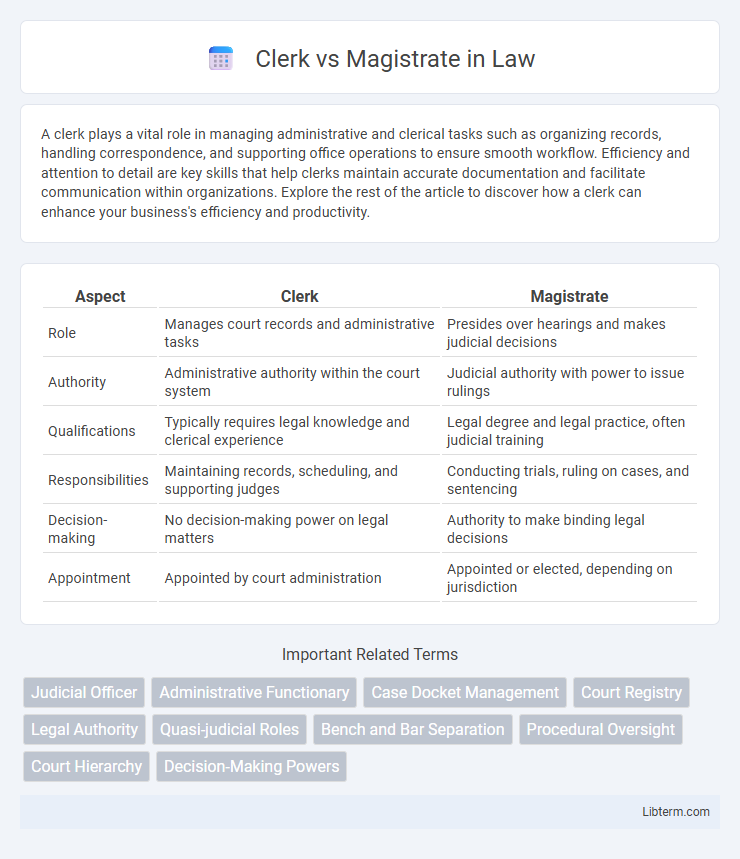A clerk plays a vital role in managing administrative and clerical tasks such as organizing records, handling correspondence, and supporting office operations to ensure smooth workflow. Efficiency and attention to detail are key skills that help clerks maintain accurate documentation and facilitate communication within organizations. Explore the rest of the article to discover how a clerk can enhance your business's efficiency and productivity.
Table of Comparison
| Aspect | Clerk | Magistrate |
|---|---|---|
| Role | Manages court records and administrative tasks | Presides over hearings and makes judicial decisions |
| Authority | Administrative authority within the court system | Judicial authority with power to issue rulings |
| Qualifications | Typically requires legal knowledge and clerical experience | Legal degree and legal practice, often judicial training |
| Responsibilities | Maintaining records, scheduling, and supporting judges | Conducting trials, ruling on cases, and sentencing |
| Decision-making | No decision-making power on legal matters | Authority to make binding legal decisions |
| Appointment | Appointed by court administration | Appointed or elected, depending on jurisdiction |
Introduction to Clerk and Magistrate Roles
Clerks manage administrative duties in courts, including maintaining records, processing legal documents, and supporting judges with case management. Magistrates preside over minor legal matters, conduct preliminary hearings, and issue rulings or decisions in lower courts. Both roles are essential in ensuring the efficient operation of the judicial system.
Defining the Duties of a Clerk
A Clerk primarily manages courtroom administration, maintaining accurate records, filing legal documents, and scheduling hearings to ensure efficient judicial processes. Unlike a Magistrate, who presides over cases and makes rulings, a Clerk supports the court by organizing case files and facilitating communication between parties. Clerks play a crucial role in case management, evidentiary documentation, and maintaining court dockets essential for smooth judicial operations.
Responsibilities of a Magistrate Explained
A Magistrate primarily presides over legal proceedings, ensuring that investigations, trials, and hearings are conducted fairly and according to the law. They have the authority to issue warrants, make rulings on bail, and adjudicate minor criminal offenses, civil disputes, and preliminary hearings in more serious cases. Magistrates also enforce courtroom procedures, interpret laws, and sometimes oversee alternative dispute resolution methods.
Key Differences Between Clerk and Magistrate
Clerks primarily handle administrative duties such as maintaining court records, managing case files, and assisting judges with documentation, whereas magistrates possess judicial authority to preside over hearings, issue warrants, and make legal decisions. Magistrates have the power to adjudicate minor criminal offenses, conduct preliminary hearings, and enforce court orders, roles that clerks do not perform. The distinction lies in clerks supporting the judiciary through clerical functions, while magistrates actively participate in the judicial process through decision-making and law enforcement.
Qualifications and Educational Requirements
Clerks typically require a high school diploma or associate degree, often supplemented by on-the-job training or certification programs in legal or administrative fields. Magistrates generally need a law degree (Juris Doctor) and must be licensed attorneys, meeting specific state requirements for legal practice and judicial appointments. Advanced knowledge of legal procedures and strong analytical skills are essential for magistrates, whereas clerks focus more on administrative support within the judicial system.
Day-to-Day Tasks: Clerk vs Magistrate
Clerks primarily manage court records, schedule hearings, and assist with administrative tasks to ensure smooth court operations. Magistrates handle judicial responsibilities such as presiding over preliminary hearings, issuing warrants, and making decisions on minor legal matters. While clerks focus on procedural and clerical duties, magistrates engage directly with legal adjudication and case management.
Authority and Decision-Making Power
Clerks primarily manage administrative tasks and maintain court records without authority to make legal decisions, focusing on procedural support within the judicial system. Magistrates possess judicial authority to preside over preliminary hearings, issue warrants, and make binding decisions on minor offenses and civil matters. The decision-making power of magistrates directly impacts case outcomes, whereas clerks facilitate court operations without influencing judicial rulings.
Career Growth and Advancement Opportunities
A Magistrate typically has greater career growth and advancement opportunities due to their judicial role, which can progress to higher courts or specialized judicial positions. Clerks often start in administrative or legal support roles with pathways leading to senior clerkship or transitioning into legal professions through further education. The Magistrate's career trajectory is more defined within the judiciary, whereas Clerks benefit from diverse opportunities in both legal and administrative fields.
Work Environment and Challenges
Clerks typically work in office settings within courthouses, managing administrative tasks such as record-keeping, filing, and assisting judges with case documentation, facing challenges like high workloads and strict deadlines. Magistrates operate in courtroom environments, presiding over preliminary hearings, issuing warrants, and making legal determinations, often handling complex cases with limited information under time pressure. Both roles demand attention to detail and strong organizational skills while navigating legal procedures and maintaining professional conduct in high-stakes judicial settings.
Conclusion: Choosing Between Clerk and Magistrate
Selecting between a clerk and a magistrate depends on the specific legal responsibilities and decision-making authority required. Clerks primarily handle administrative tasks, record keeping, and support functions within the judicial system, while magistrates possess judicial powers to adjudicate minor offenses and pretrial matters. Understanding the scope of duties and legal authority is crucial for making an informed choice between these roles.
Clerk Infographic

 libterm.com
libterm.com